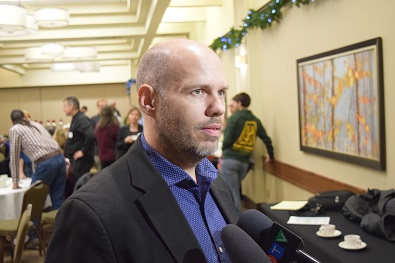SHIP Executive Director Shuan Dyck speaks to reporters in Saskatoon. Photo by Joel Willick.
In 2015, the Saskatoon Housing Initiatives Partnership held a one-day gathering of information, where they determined 60 per cent of the city’s homelessness population was Indigenous.
A conference hosted by the organization on Wednesday was looking to address that trend.
The conference brought together like-minded individuals from several different organizations across the province to discuss best practices to move forward to help curb the number of Indigenous people without homes.
SHIP’s Executive Director, Shaun Dyck, says Indigenous homelessness has unfortunately become a growing issue in the province.
“We see a majority of the people facing and experiencing homelessness are Indigenous,” he said. “However, the bright light in Saskatoon is we have several Indigenous-led organizations devoted to addressing the homelessness issue.”
Dyck says the Housing First Initiative has been key to helping get people off the streets in Saskatoon. Housing First is an initiative that says people need a house to live in first before they can overcome other issues they face like unemployment or addiction. The conference looked at this, along with several other ideas.
One of the keynote speakers was Sydney Gill of the Aboriginal Friendship Centre in Calgary. Gill spoke about the importance of returning to traditional Indigenous practices, as a way to address homelessness.
“The men and women we work with were directly from the residential schools, the Sixties Scoop, the child and welfare system,” he said. “These people have had that piece taken from them, and when you give that piece back, it is amazing what they can do with the opportunity.”
Gill says in his experience, the Indigenous homelessness population keeps returning to the Friendship Centre for the traditional practices like smudging and sweat lodges. He says that also brings them one step closer to housing.
Gill also pleaded with conference attendees to embrace reconciliation and the TRC Calls to Action.
“We have a chance to reset and change the whole country,” he told them.
Wednesday is National Housing Day, and the federal government is expected to put forward a national housing strategy.
Shaun Dyck says he heard the strategy may contain legislation on housing rights. This is something he is very hopeful for.
“We could see housing as a basic human right for people, which is a wonderful thing moving forward, and we can focus the government’s attention on where the need is,” he said.
